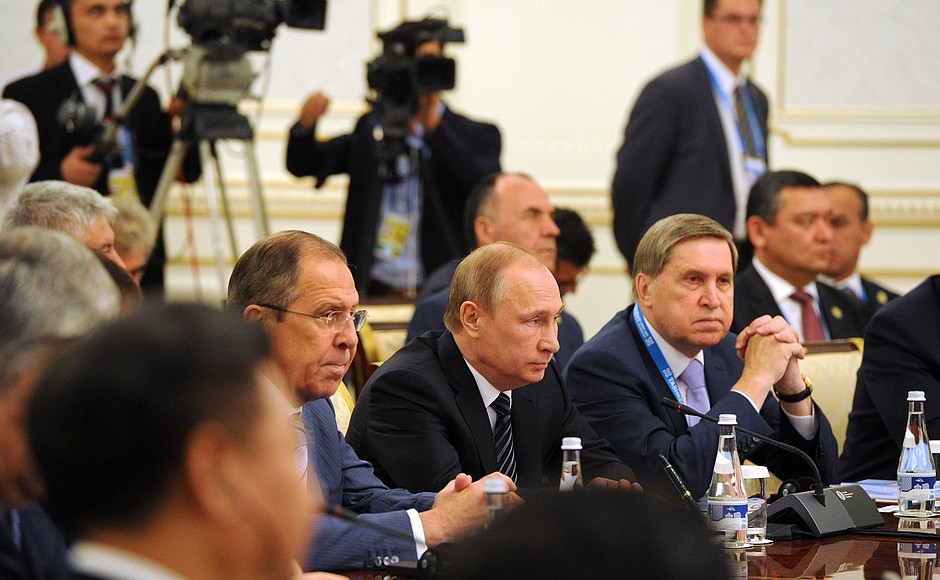
President of Russia Vladimir Putin: Mr Karimov, colleagues, friends,
We are meeting in an anniversary year. Over these 15 years, the SCO’s authority and its influence on regional processes have increased considerably. Working together within the SCO is one of Russia’s foreign policy priorities. We will continue making active efforts to develop the organisation’s potential and strengthen its role in international and regional affairs.
In our view, the fact that the SCO’s activity is built on the principles of equality, mutual respect and consideration of each other’s interests is a guarantee of its successful development. There are now 18 countries taking part in the organisation’s work: the 6 founding members, 6 observer states, and 6 dialogue partners. These countries together account for more than 16 percent of gross global product, not to mention their share in the world’s population, which stands at 45 percent.
The procedures for India and Pakistan’s accession as full members of the SCO is near completion now. The important political decision to begin the accession procedure was taken last year in Ufa.
One of the outcomes of this year’s summit is the planned signing of memorandums on obligations that India and Pakistan must fulfil in order to become full members of the organisation. We hope that our partners will complete these steps as soon as possible, in time for our next meeting in Kazakhstan.
In the meantime, we need to start directly integrating India and Pakistan into the SCO’s regular cooperation mechanisms such as the Council of Heads of State and the regular meetings of member states’ foreign ministers.
Since 2005, Iran has been a longstanding and active observer state in the SCO. We think that now that the Iranian nuclear issue has been settled and the UN sanctions lifted, there are no obstacles in the way of a positive assessment of Tehran’s membership application.
Colleagues, the Ufa SCO development strategy drafted last year at Russia’s initiative outlines the main long-term directions for our work together. We will approve today the plan for implementing this strategy through 2020.
This document covers more than 70 political, economic and cultural measures designed to achieve practical results and make our cooperation within the organisation more effective.
Our greatest cooperation priority is certainly ensuring security throughout the SCO area. We also need to continue developing our regional antiterrorist structure’s potential, improve coordination between our security and law enforcement agencies within the framework of the UN and other international organisations, speed up work on drafting the SCO convention on combating extremism, update our anti-narcotics strategy and its implementation programme, and strengthen the legal base for information security cooperation.
Of course, the situation in Afghanistan also requires our particular attention. It is essential to work together with our partners in Afghanistan to step up counterterrorism efforts to combat the terrorist threat in that country and fight cross-border organised crime, prevent drug production and trafficking, and give Afghanistan practical help in its national reconciliation and economic recovery process.
Developing close economic cooperation is another important part of the SCO’s activity. We must continue removing barriers to trade and capital and labour movement, deepen our industrial and technological cooperation, and develop industrial chains and a common transport infrastructure.
The start of talks on linking the Eurasian Union and China’s Silk Road Economic Belt project opens up good prospects in this area. I am sure that involving all of the SCO member states and the CIS countries in this integration process would pave the road for developing a broad Eurasian partnership.
I would like to note that Southeast Asian countries have shown interest in the SCO’s economic dimension. This was something we discussed at the recent Russia-ASEAN summit in Sochi.
Financial development institutes can also contribute to the successful implementation of multilateral economic projects within the SCO framework, particularly the Eurasian Bank, the Asian Infrastructure Investment Bank, and the BRICS New Development Bank.
The steady development in our humanitarian cooperation within the organisation is certainly cause for satisfaction. The tourism development programme we are adopting today will create a common tourism space and give tourists greater safety.
Among our most significant education projects is the SCO University, which links together around 80 universities from our different countries in a single teaching network. We hope that the intergovernmental agreement regulating this university’s legal status will be signed by the end of this year.
The SCO student forum and youth council play a positive part. Let me mention in particular the initiative to draft the SCO Youth Card, which would offer students discounts on travel, accommodation, and visits to museums and other cultural and historical sites in the member countries.
Colleagues, I would like to conclude by thanking Uzbekistan’s government and President Islam Karimov for the hospitality we have been shown here. I also want to wish success to our Kazakhstani friends, who now take over the presidency in the SCO.
Thank you for your attention.